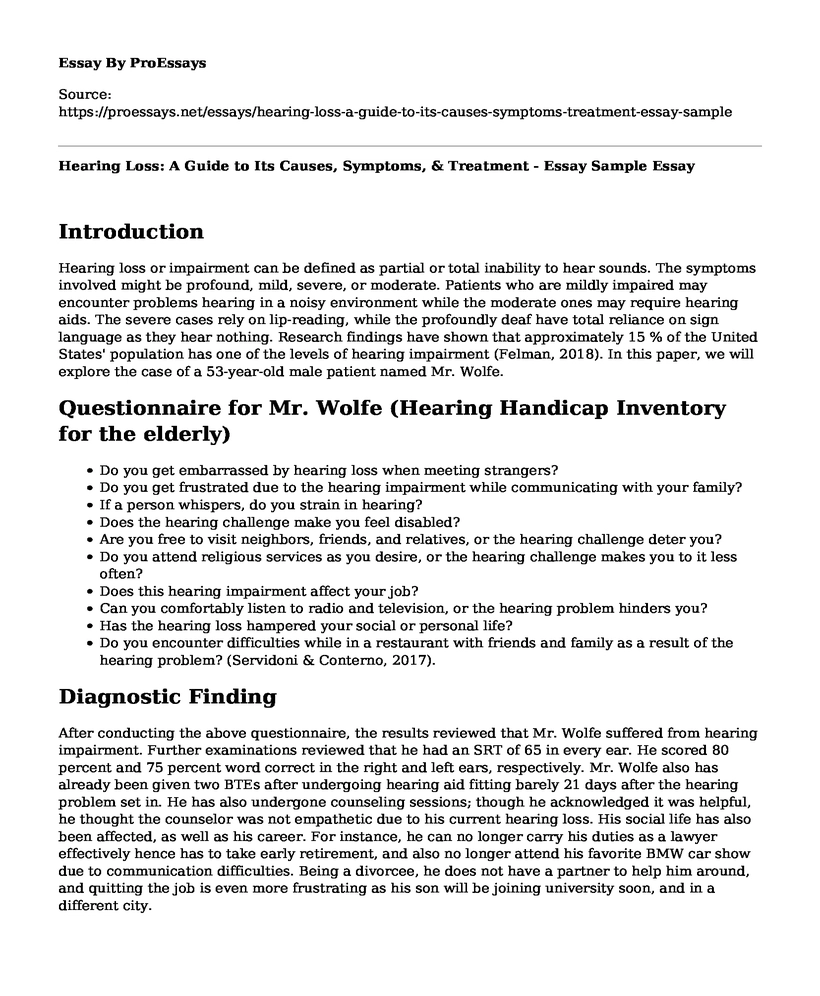Introduction
Hearing loss or impairment can be defined as partial or total inability to hear sounds. The symptoms involved might be profound, mild, severe, or moderate. Patients who are mildly impaired may encounter problems hearing in a noisy environment while the moderate ones may require hearing aids. The severe cases rely on lip-reading, while the profoundly deaf have total reliance on sign language as they hear nothing. Research findings have shown that approximately 15 % of the United States' population has one of the levels of hearing impairment (Felman, 2018). In this paper, we will explore the case of a 53-year-old male patient named Mr. Wolfe.
Questionnaire for Mr. Wolfe (Hearing Handicap Inventory for the elderly)
- Do you get embarrassed by hearing loss when meeting strangers?
- Do you get frustrated due to the hearing impairment while communicating with your family?
- If a person whispers, do you strain in hearing?
- Does the hearing challenge make you feel disabled?
- Are you free to visit neighbors, friends, and relatives, or the hearing challenge deter you?
- Do you attend religious services as you desire, or the hearing challenge makes you to it less often?
- Does this hearing impairment affect your job?
- Can you comfortably listen to radio and television, or the hearing problem hinders you?
- Has the hearing loss hampered your social or personal life?
- Do you encounter difficulties while in a restaurant with friends and family as a result of the hearing problem? (Servidoni & Conterno, 2017).
Diagnostic Finding
After conducting the above questionnaire, the results reviewed that Mr. Wolfe suffered from hearing impairment. Further examinations reviewed that he had an SRT of 65 in every ear. He scored 80 percent and 75 percent word correct in the right and left ears, respectively. Mr. Wolfe also has already been given two BTEs after undergoing hearing aid fitting barely 21 days after the hearing problem set in. He has also undergone counseling sessions; though he acknowledged it was helpful, he thought the counselor was not empathetic due to his current hearing loss. His social life has also been affected, as well as his career. For instance, he can no longer carry his duties as a lawyer effectively hence has to take early retirement, and also no longer attend his favorite BMW car show due to communication difficulties. Being a divorcee, he does not have a partner to help him around, and quitting the job is even more frustrating as his son will be joining university soon, and in a different city.
Recommendations
Besides the questionnaire, there is a need for other screening tests. The screening tests to be carried include finger rubbing, watch tick tests, handheld audiometers, and whispering. The combination of the tests will help to identify if Mr. Wolfe has an objective or subjective hearing impairment. Before deciding whether to retain or change the hearing aids, further diagnosis of hearing loss will be done via a pure-tone audiogram (Hearing Loss Association of America, 2017). After the screening tests and pure-tone audiogram, Mr. Wolfe was found to have an objective hearing impairment.
The audiogram identified his hearing problem as symmetrical mild to profound sensor neural. Mr. Wolfe will retain his BTEs besides using Corticosteroids, diuretics, and low-sodium diet to decrease swelling of cochlea hair cells after being exposed to loud music. The combination is likely to offer a solution, but if not, cochlear implants may be considered. While under this treatment, he will also need to attend counseling sessions to help him overcome the frustration; hence I will give him a recommendation letter renown counseling professional with a rehab center for the hearing impaired in his city.
Conclusion
The rehabilitation will help him familiarize himself with his current situation by interacting with others with similar challenges. The counseling sessions will be more helpful than the previous ones because this counselor has handled similar cases before hence s likely to be more empathetic. Living without a wife, the son joining the university in another city, and quitting are traumatic events that need counseling and rehabilitation.
References
Felman, A. (2018, June 27). Deafness and hearing loss: Causes, symptoms, and treatments. Health News - Medical News Today. Retrieved April 20, 2020, from https://www.medicalnewstoday.com/articles/249285
Hearing Loss Association of America. (2017, September 27). Types, causes, and treatment. Retrieved April 20, 2020, from https://www.hearingloss.org/hearing-help/hearing-loss-basics/types-causes-and-treatment/
Servidoni, A., & Conterno, L. (2017). Hearing loss in the elderly: Is the hearing handicap inventory for the elderly - Screening version effective in diagnosis when compared to the audiometric test? International Archives of Otorhinolaryngology, 22(01), 001-008. https://doi.org/10.1055/s-0037-1601427
Cite this page
Hearing Loss: A Guide to Its Causes, Symptoms, & Treatment - Essay Sample. (2023, May 24). Retrieved from https://proessays.net/essays/hearing-loss-a-guide-to-its-causes-symptoms-treatment-essay-sample
If you are the original author of this essay and no longer wish to have it published on the ProEssays website, please click below to request its removal:
- Critical Infrastructure and Key Resources (Cikr) Essay
- Critical Evaluation of Auto Liberation by Knutson Article
- Essay Sample on Elderly Security: CCTV in Care Homes
- Essay Sample on COVID-19 Puts Brakes on Global Trade, Businesses Struggle
- Nurse Educator: Visualizing My Career in the Next 5 Years - Essay Sample
- Essay Example on Amazon Stock: Rapid Increase Amidst Covid-19
- Paper Example on Somatization Disorder: Distress, Physical Symptoms, and Diagnosis







